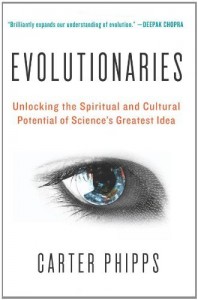We Are Moving, Part 1
September 5, 2012 Leave a comment“Innovation is as much a function of the right kind of relationships as it is of a particular kind of individual vision.”
-Carter Phipps

I capped off my summer reading with what was for me a fascinating and important book – Evolutionaries by Carter Phipps. Phipps is the editor of EnlighteNext magazine and enthusiastic about the evolutionary worldview and how it is showing up in many different fields, from biology to sociology to philosophy and theology, transforming our very understanding not simply of the cosmos, but of ourselves. Over the past few years, readers of this blog have probably picked up on the interest that my colleague Gibran Rivera and I share with Phipps when it comes to the evolutionary worldview. Evolutionaries does a wonderful service in deepening and broadening as well as bringing much more nuance to this perspective, rendering it more timely, accessible and applicable to the work of social change.
“The debate about our origins is also a cultural referendum on our future.”
The book is in part retrospective, looking at the history of the evolutionary perspective that shook up perceptions of a fixed world when it suggested that creation and form were not static, but ever-changing. This realization is still making waves and sinking in. Carter writes – “As the fog of fixity lifts, we are finding ourselves much more than observers and witnesses to life’s unfolding drama.” In other words, there is a greater associated sense of response-ability. He goes on to explain that the evolution he and other like-minded “evolutionaries” are talking about is trans-Darwinian/biological, inclusive of cultural transformation, and not exclusive of a spiritual perspective. He is also careful to discuss the dangerous pitfalls of an evolutionary perspective when it becomes associated with exceptionalism, as it has, especially of a particular group or species, or becomes overly deterministic. After looking at aspects of the multi-disciplinary ‘trans-humanist” movement and all that it has to say about humanity moving beyond its current external/physical form (wild but not outlandish when one looks at the trends and trajectory of technology), he considers the “inside story” of evolution and the transformation of consciousness.
“We do not have worldviews; for the most part, they have us.”
In what was perhaps the most personally provocative part of the book, Phipps talks about how the change of our inner experience of the world is often the most under-considered and under-appreciated aspect of evolution. First of all, many still do not acknowledge the extent to which our internal world shapes the external. As The Talmud says, “We do not see things as they are, we see them as we are.” And the way we are and the way we see (our worldviews) are in flux. Phipps references various theorists who point to how we tend to historically assume that our ancestors operated with the same structures of consciousness that we have today. We need only read into past assumptions of fixity in different domains to see how this is not so. “We are moving!” Phipps quotes the biologist-theologian Pierre Teilhard de Chardin as saying, and in more ways than one. But in what direction? Is there a trajectory to evolution? In conversations with a variety of people across disciplines, Phipps discerns a general direction (without a firm destination) of increasing complexity, creativity, and convergence, with a heightening capacity to reflect upon these trends, as they manifest both internally and externally.
While I will hold on any consideration of implications for the work of social change until the next post, I will say for now that all of this hints at a call for more fully embracing, and finding a balance between, self-starting creative agency and cooperative/collaborative engagement (see The Manifesto of the Creative Worker and Do-It-Together).
No Comments
Curtis – thank you so much for lifting up Phipps work and the core ideas behind evolutionaries. As you know from many of our conversations, I have found this emergent worldview to be most compelling and it is the frame from which I am looking at my own life as well as our work for social transformation – it takes the concept of movement to a whole other level doesn’t it?
Indeed!